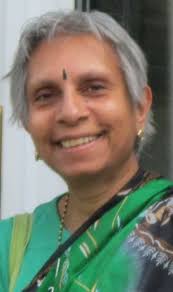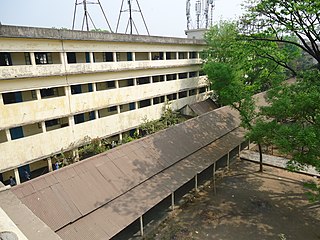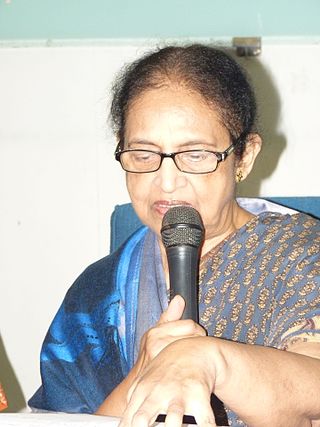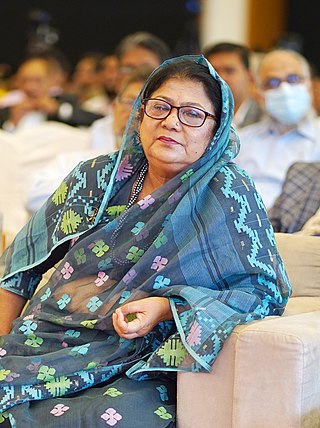Related Research Articles

Bangladesh, officially the People's Republic of Bangladesh, is a country in South Asia. It is the eighth-most populous country in the world and among the most densely populated with a population of 170 million in an area of 148,460 square kilometres (57,320 sq mi). Bangladesh shares land borders with India to the north, west, and east, and Myanmar to the southeast. To the south, it has a coastline along the Bay of Bengal. It is separated from Bhutan and Nepal by the Siliguri Corridor, and from China by the mountainous Indian state of Sikkim. Dhaka, the capital and largest city, is the nation's political, financial, and cultural centre. Chittagong is the second-largest city and the busiest port. The official language is Bengali, with Bangladeshi English also used in government.

Rokeya Sakhawat Hossain, commonly known as Begum Rokeya, was a prominent Bengali feminist thinker, writer, educator and political activist from British India. She is widely regarded as a pioneer of women's liberation in Bangladesh and India.

Neelima Ibrahim was a Bangladeshi educationist, littérateur and social worker. She is well known for her scholarship on Bengali literature but even more so for her depiction of raped and tortured women in the 1971 Bangladesh Liberation War in her book Ami Birangana Bolchi. She was awarded Bangla Academy Literary Award in 1969, Begum Rokeya Padak in 1996 and Ekushey Padak in 2000 by the Government of Bangladesh for her contributions to Bangla literature.

Shahabuddin Ahmed is a Bangladeshi painter. He was awarded the Chevalier De L'ordre Des Arts Et Des Lettres by the Ministry of Cultural Affair and Communication of France in 2014. He was the recipient of Independence Day Award by the Government of Bangladesh in 2000. His paintings are displayed in galleries like Olympic Museum, Lausanne, Switzerland, Municipal Museum of Bourg-en-Bresse, France, Seoul Olympic Museum, South Korea, the National Taiwan Museum and Bangladesh National Museum.

Debjani Chatterjee MBE is an Indian-born British poet and writer. She lives in Sheffield, England.

British Bangladeshis are people of Bangladeshi origin who have attained citizenship in the United Kingdom, through immigration and historical naturalisation. The term can also refer to their descendants. Bengali Muslims have prominently been migrating to the UK since World War II. Migration reached its peak during the 1970s, with most originating from the Sylhet Division. The largest concentration live in east London boroughs, such as Tower Hamlets. This large diaspora in London leads people in Sylhet to refer to British Bangladeshis as Londoni.
Runa Islam is a Bangladeshi-born British visual artist and filmmaker based in London. She was a nominee for the 2008 Turner Prize. She is principally known for her film works.

Agrani School and College was established at Azimpur, Dhaka, Bangladesh, in 1957 as a kindergarten. From the inception, the medium of instruction was English, although vernacular was also taught in all classes. It was upgraded into a secondary school for girls in 1967. It introduced higher secondary courses in 1994, when it got a new status of school cum college. It offers courses in humanities, commerce and science. There are approximately 4,500 students.

Geeta Kapur is a noted Indian art critic, art historian and curator based in New Delhi. She was one of the pioneers of critical art writing in India, and who, as Indian Express noted, has "dominated the field of Indian contemporary art theory for three decades now". Her writings include artists' monographs, exhibition catalogues, books, and sets of widely anthologized essays on art, film, and cultural theory.

Martha Alter Chen is an American academic, scholar and social worker, who is presently a lecturer in public policy at the Harvard Kennedy School and senior advisor of the global research-policy-action network WIEGO and a member of the Advisory Board of the United Nations University World Institute for Development Economics Research (UNU-WIDER). Martha is a development practitioner and scholar who has worked with the working poor in India, South Asia, and around the world. Her areas of specialization are employment, poverty alleviation, informal economy, and gender. She lived in Bangladesh working with BRAC, one of the world's largest non-governmental organizations, and in India, as field representative of Oxfam America for India and Bangladesh for 15 years.
Syeda Amina Khatun, MBE is a British Labour Party politician, councillor for Tipton Green in the Sandwell Metropolitan Borough Council and Cabinet Advisor for Education. In 1999, she was the first Bangladeshi woman to be elected in the Midlands region.

Shamim Azad is a Bangladeshi-born British bilingual poet, storyteller and writer. She won 2023 Bangla Academy Literary Award in the poetry category.
Shireen Jawad is a Bangladeshi British singer.

Feminism in Bangladesh seeks equal rights of women in Bangladesh through social and political change. Article 28 of Bangladesh constitution states that "Women shall have equal rights with men in all spheres of the State and of public life".

Sara Hossain is a Bangladeshi lawyer. She is a barrister in the Supreme Court of Bangladesh. She is the honorary executive director of the Bangladesh Legal Aid and Services Trust (BLAST), a major legal aid provider. She has been at the forefront of advocating for women's rights in Bangladeshi courts and played a key role in drafting legal reforms to protect women. She was the plaintiff's lawyer in the landmark case of Bangladesh National Women Lawyers Association (BNWLW) v. Bangladesh, in which the Supreme Court supported the judicial practice of referring to international human rights law in the absence of domestic legislation. She is known for her role in challenging fatwa violence when a fatwa is issued to mete out punishment to women and girls. She co-edited 'Honour': Crimes, Paradigms and Violence Against Women with Lynn Welchman.

Najma Chowdhury was a Bangladeshi academic.

Hasna Begum was a Bangladeshi philosopher and feminist, and a professor of philosophy at the University of Dhaka until her retirement in December 2000.

Shireen Akhter is a Bangladeshi academic. She was the first female vice chancellor of the University of Chittagong.
Rahemur Rahman. is a British-Bengali artist and fashion designer known for his significant contributions to the British-Bengali diaspora and innovative use of traditional Bengali block printing techniques through his eponymous menswear label. Rahman is known for his focus on sustainable and ethically produced garments and is the first Bangladeshi fashion designer in history to showcase their work at London Fashion Week.
References
- ↑ "SUPPLEMENT TO THE LONDON GAZETTE, 15TH JUNE 1996". The London Gazette. 15 June 1996. Retrieved 17 March 2020.
- ↑ "Collections Online | British Museum". Britishmuseum.org.
- 1 2 3 4 5 Adams, Caroline; Rae, Annie (1 April 1997). "Obituary: Shireen Akbar". The Independent. Retrieved 16 March 2020.
- 1 2 3 4 5 Deitz, Paula (21 August 1997). "Textiles Give South Asian Women Creative Outlet and Acclaim". The New York Times. ISSN 0362-4331 . Retrieved 9 March 2024.
- ↑ "Shireen Akbar". www.nehrutrustvam.org.